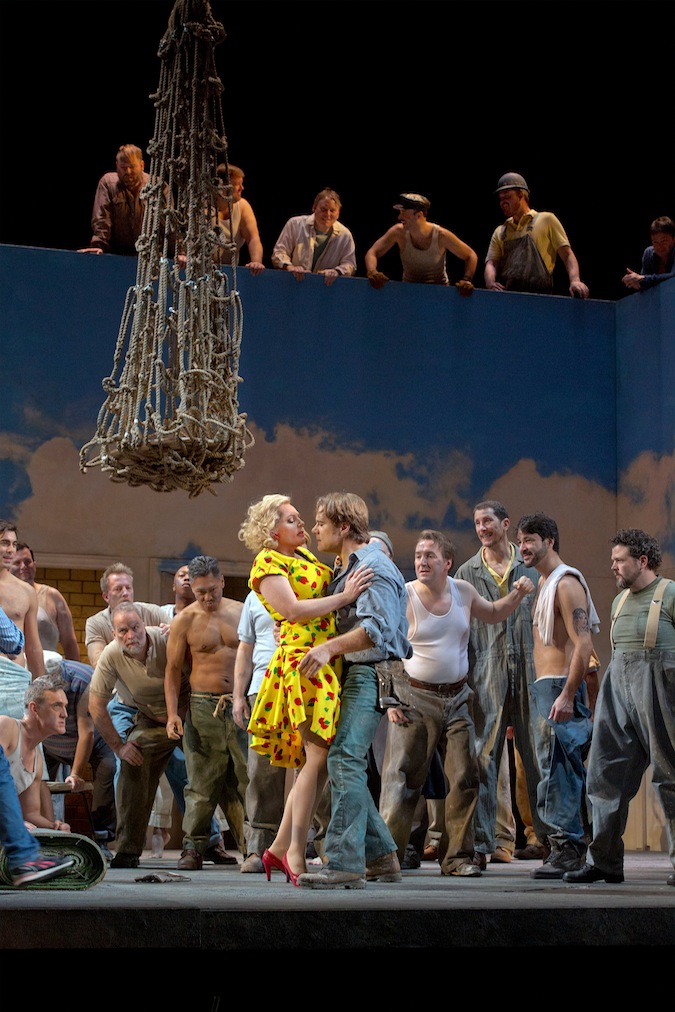Met’s “Lady Macbeth” offers a dark and engrossing descent into the bizarre

Eva-Maria Westbroek as Katerina and Brandon Jovanovich as Sergei in Shostakovich’s “Lady Macbeth of Mtsensk” at the Metropolitan Opera. Photo: Ken Howard
Dmitri Shostakovich’s Lady Macbeth of Mtsensk has a short history in New York. Monday’s performance was only the sixteenth of the work in the Metropolitan Opera’s history, following earlier runs of the same production in 1994 and 2000. Its longer history goes back to 1934, when the opera’s premiere was a major success for the young, ascendent Soviet composer.
But only two years later, a performance attended by Stalin was followed by an anonymous denunciation, infamously pronouncing the work “Muddle instead of music.” This was only the first in a series of incidents that would plague Shostakovich’s career, the troubles only settling after Stalin’s death in 1953.
Eighty years after the opera’s premiere, Graham Vick’s production, itself twenty years old, still makes this masterful work seem subversive. Based on a novel by Nikolai Leskov, Alexander Preis’s libretto centers on Katerina, the unhappy young wife of Zinovy Ismailov, a middle-class merchant. After an affair with the laborer Sergei, she murders her uncaring husband and his brutish father Boris, only to be found out on the day of her wedding to her new lover. The two are sentenced to labor in Siberia, but on their way Sergei betrays Katerina for Sonyetka, another prisoner, whom she drags into a river in the final, chilling scene.
To say that Vick “sets” the production in early-1960s suburbia would be missing the point. True, we discover Katerina lounging in a massive armchair, wearing a garish, yellow flower print dress. A boxy television set with a faux wood frame occupies most of Boris’s attention, and an equally boxy, red car moves on and off stage.
But beyond any consideration of time or place, Vick’s conception is bizarre, bewildering, and completely engrossing. The walls of Paul Brown’s sets, which remain throughout all four acts, are painted with clouds against a blue sky, set with seemingly countless identical doors through which the chorus intrudes again and again, often at intimate moments. A mix of the horrifying and the hilarious keeps up a dizzying tempo through the first three acts. A gaggle of brides bursts on during the first act, carrying vacuum cleaners as stage microphones, dance partners, and objects of sexual desire.
Far from confusing the opera, Vick’s often grotesque vision elucidates it. In some ways, Lady Macbeth is so odd to begin with that it takes an even stranger interpretation to make sense of it. The score is notorious for its explicit depiction of Katerina’s first sexual liaison with the laborer Sergei (Trombone slides are prominently featured; you can fill in the rest). Vick pulls no punches, taking the tryst to every corner of—and object on—the set. Nor does he shy away from the fact that sex and violence are inextricably linked in this score and this libretto; Katerina is insistent and frantic in her protestations, and Sergei thuggish in ignoring them.
If the first three acts thrive on the juxtaposition of comedy and horror, the final act strips away everything that could be seen as joyful. The score turns desolate as a column of prisoners trudges on, singing dolefully as they trod out their forced march.
Eva-Maria Westbroek’s finest singing (and acting) as Katerina came in this bleak fourth act; torn by Sergei’s betrayal, she seemed to break from reality (or whatever reality was being represented), her face a complete blank as she floated a gorgeous, soft tone into the house in her distracted reminiscences. Her full, round tone made her an alluring Katerina, and she produced dark, luscious hues in the early acts.
Westbroek was supported by a cast that was superb from top to bottom. The tenor Brandon Jovanovich brought a generous, golden tone to the role of Sergei, and managed to find some humanity in a fairly shallow, unsympathetic character, even as his abuses—first of his fellow worker Askinya, then of his lover—made us cringe. Anatoli Kotscherga was tremendous as Boris. He made for a brutish, loutish lech, and had a gravelly, gristly voice to match. He wasn’t exactly a pleasant presence on the stage, but he’s not supposed to be—his spectacular vocal power made him an imposing force.
Mikhail Kolelishvili was a worthy crowd favorite in his company debut, a leathery-voiced, raunchy priest. Vladimir Ognovenko sang the role of the police sergeant with a huge, molasses tone. Dmitry Belosselskiy stood out as the nameless old convict, his cavernous voice serving to ground the final act. Donald Palumbo’s chorus was excellent as ever, singing with feverish excitement in the early crowd scenes, but closing the opera with a solemn hush in the final chorus of the prisoners.
The American conductor James Conlon, who conducted the Met’s first Lady Macbeth back in 1994, was brilliant, and the Met orchestra played at its very best. Winning solos dotted the score here and there, but beautiful meshes and ear-popping jolts were the order of the evening, delivered with constant intensity and tremendous polish. A sense of unease underpinned the playing throughout, a perfect fit for Shostakovich’s biting, sardonic voice.
One might not have expected Shostakovich to sell out the Met (attendance at last year’s opening of The Nose looked anemic by comparison), but by all appearances the house was packed. The electric response at the curtain call rivaled that given to this season’s other Lady Macbeth back in the season’s opening week. Monday was a triumph in its own right, but moreover, it gave the lie to claims that New York audiences can’t handle anything but plain-vanilla standard repertory. The crowds turned out on Monday for a performance that was completely off-the-wall by the Met’s standards, and they ate it up.
Lady Macbeth of Mtsensk runs through November 29. metoperafamily.org.




Posted Nov 15, 2014 at 9:43 am by CastaDiva
This is the best review I have read of this wonderful production. I went to it last Thurs., and truly, it is one of the finest things the Met has ever produced, perfection from start to finish. The entire cast was superb, from the principals to the smaller roles. And the Met orchestra played Shostakovich’s thrilling score so magnificently, that the music grabbed the listener in its thrall and never let go. I plan to see it again, as this is something special. How can the Met have omitted this from its HD and radio broadcasts?
Posted Nov 18, 2014 at 2:28 am by Sergey
Yes, music was performed beautifully.
Singing left a bit to be desired to a native Russian speaker but it still was great.
Yet the PHILOSOPHY of the production was went way below the belt.
The original work itself was vulgar enough but it had a meaning.
This Mets production made an effort to make this opera way more vulgar by using each and every trick imaginable to the point when music and feelings are obscured by pointlessly obscene acting. Come on, this opera is supposed to be about passion too, not just lust. It felt fake. It felt way too grotesque.
I recon in the next reincarnation of this opera the Mets should consider doing at least some scenes in nude and with actors having only real sex. It will definitely make it less vulgar as compared to the play we saw last night, and it will hopefully return some of the original meaning to this work of art.